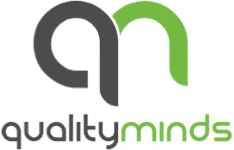An interview with Tobias, Head of IT and Team Lead R&D at QualityMinds
Working model: Tobias has a lot of experience with remote work: he has been working remotely as a Software Developer Backend / Infrastructure in project work for 9 years. In the following blog post, you can find out why he is a fan of remote work and why he still takes a car journey of several hours at least once a month to meet his colleagues in the office.
Why does remote work work for you? What do you like about this model?
Tobias: For me, a big advantage of remote work compared to a traditional office job is that I can work wherever I want and am flexible. I’ve found some favorite places in my home where I can work well. I also like the fact that I can create the ideal working environment for myself thanks to remote work. For instance, I’m more productive when I can hear background noise at work, others can work better in quieter environments. If I want a different workspace, I go to a nearby co-working space, a café or, when the weather is nice, I like to get some fresh air in the garden or park.
A significant advantage of remote work for me as a father is that I was able to spend many precious moments with my little son in his first few months. I definitely wouldn’t want to miss this time watching him grow up. Unfortunately, many people don’t have this great opportunity if you work shifts, for example. You often notice this when talking to customers, who are very positively surprised when you tell them that you can stay at home with your little one. QualityMinds also offers me ‘children’s sick days’, which I can take flexibly after consultation with my colleagues if my child is sick.

What are the challenges?
Tobias: On one hand, remote work offers numerous advantages, on the other hand there are also some challenges, especially if you pursue this working model in the long term.
For one thing, working from home carries a higher risk of distraction, as everyday life at home can detract from work tasks. If my family asks me to do something ‘just for a minute’, I refuse – I’m not available for other things during my working hours, and that’s important.
You also have to be careful not to succumb to the danger of ‘digging yourself in’ in the home office and working in isolation from the rest of the team. Especially in IT projects that require little team interaction, contact with colleagues can sometimes be unconsciously neglected. Small talk at the coffee machine in the office is also simply missing. But the communication tools we use at QualityMinds, such as Slack, help to replace such things. What makes things more complicated for me is that I live further away from my workplace and can’t easily meet up with my team at the weekend.
Solutions for my projects are also found more quickly in the office, as my colleagues can see immediately when I need support and we can quickly find ideas together.
So you have to consciously create many processes and mechanisms yourself when working remotely that come naturally in everyday office life.
What tricks help you to optimize remote work?
Tobias: An anecdote: a colleague always sat at his desk in a suit while working from home. He inspired me and I now get ready every morning as if I were going to the office. This not only helps me to put myself in a professional working mood, but also sends a clear signal to my family that my working hours are about to begin and I don’t want to be distracted.
While such rituals arise almost automatically in everyday office life and are often not consciously noticed, such as going to the coffee kitchen every day for a quick chat with colleagues, they have to be actively created and maintained when working from home. They help to draw the line between work and private life in the home office and create clear conditions for me and my family.
This also includes regular communication with colleagues. Huddles in Slack allow me to stay in contact with my colleagues despite the great physical distance and maintain a sense of shared work and team spirit. Targeted measures such as regular virtual coffee breaks or team meetings via video chat can promote this exchange and replace the lack of spontaneous encounters in the office. Such deliberately introduced rituals help to strengthen collaboration and team spirit. In conclusion, fixed rituals really work for me when it comes to organizing the daily routine of my remote work job.
How does communication differ?
Tobias: Remote work also means rethinking communication. I actively approach my team colleagues and ask them for support when I need it. In home office, pull communication predominates, where I have to take the initiative and ask for information myself. In contrast to push communication in the office, where colleagues approach me on their own initiative and automatically see when I need help.
The small conversations in the coffee kitchen play an important role in everyday office life – they allow me to look at projects from a new perspective and gain fresh insights. In the home office, a huddle in Slack allows me to have these valuable conversations. My colleagues have already gotten used to getting calls from me just like that.
Conclusion
Tobias: Remote work offers me many advantages, including the freedom to design my own workplace and the opportunity to spend more time with my family.
The challenge with remote work is to break out of the routine and consciously create rituals and structures that help to replace the small but important office routines.


0 Comments